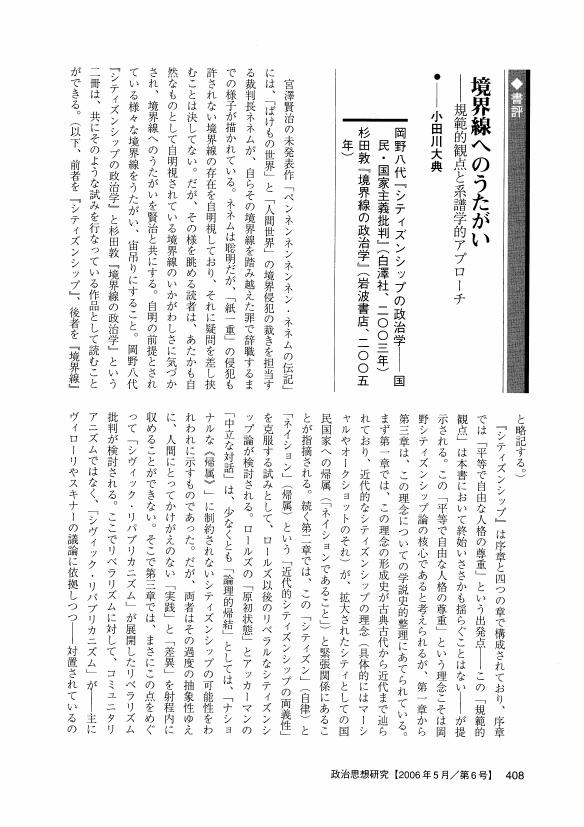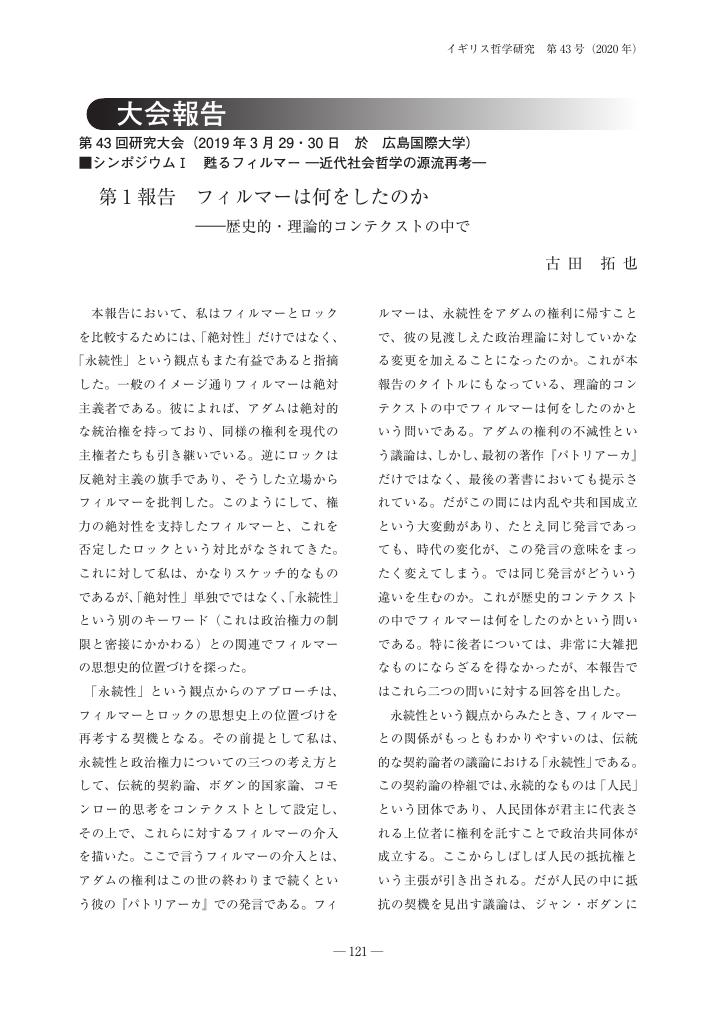19 0 0 0 OA 崇高と政治理論
- 著者
- 小田川 大典
- 出版者
- JAPANESE POLITICAL SCIENCE ASSOCIATION
- 雑誌
- 年報政治学 (ISSN:05494192)
- 巻号頁・発行日
- vol.57, no.2, pp.125-149,265, 2006 (Released:2010-04-30)
- 参考文献数
- 34
In his later work, L'inhumaine: Causeries sur le temps (1988), Jean-François Lyotard advocated the aesthetic political theory under the influence of Edmund Burke's early writing, A Philosophical Enquiry into the Origin of our Ideas of the Sublime and Beautiful (1759), though little attention has been paid to this point so far. This paper is intended as the examination of Burke's physiological aesthetics of sublimity and Lyotard's postmodern theory of the sublime from the perspective of political philosophy. Indeed, they didn't preach Kantian moral principles, but claimed the necessity of cultivation of the ethical sensibility through the aesthetical experience of the sublime in their theories. We may go on from this to the conclusion that it is what Stephen White called “the sense of responsibility to otherness” and “the world-disclosing function of language” in his work, Political Theory and Postmodernism (1991) that Burke and Lyotard emphasized the importance of.
16 0 0 0 OA 戦後日本における歴史的政治学の展開
- 著者
- 小田川 大典
- 出版者
- 教育史学会
- 雑誌
- 日本の教育史学 (ISSN:03868982)
- 巻号頁・発行日
- vol.61, pp.63-68, 2018 (Released:2019-04-01)
- 参考文献数
- 17
- 著者
- 小田川 大典
- 出版者
- 岡山大学
- 雑誌
- 岡山大學法學會雜誌 (ISSN:03863050)
- 巻号頁・発行日
- vol.50, no.3, pp.611-648, 2001-03
12 0 0 0 OA 一九-二〇世紀転換期における「戦争ロマン」の表象についての比較文化史研究
- 著者
- 山室 信一 小関 隆 岡田 暁生 伊藤 順二 王寺 賢太 久保 昭博 藤原 辰史 早瀬 晋三 河本 真理 小田川 大典 服部 伸 片山 杜秀
- 出版者
- 京都大学
- 雑誌
- 基盤研究(B)
- 巻号頁・発行日
- 2009
本研究においては、女性や子ども更には植民地における異民族までが熱狂をもって戦争に参与していった心理的メカニズムと行動様式を、各国との比較において明らかにすることを目的とした。そこでは活字や画像、音楽、博覧会などのメディアが複合的に構成され、しかも複製技術の使用によって反復される戦争宣伝の実態を明らかにすることができた。そして、このメディア・ミックスを活用する重要性が認識されたことによって、外務省情報部や陸軍省新聞班などが創設されることとなった。戦争ロマンの比較研究から出発した本研究は、戦争宣伝の手法が「行政広報」や「営利本位の商業主義」に適用されていく歴史過程を明らかにすることによって、総力戦という体験が現代の日常生活といかに直結しているのかを析出した点で重要な成果を生んだ。
7 0 0 0 OA 境界線へのうたがい
- 著者
- 小田川 大典
- 出版者
- 政治思想学会
- 雑誌
- 政治思想研究 (ISSN:1346924X)
- 巻号頁・発行日
- vol.6, pp.408-411, 2006-05-01 (Released:2012-11-20)
6 0 0 0 OA 書評
2 0 0 0 崇高と政治理論:バーク, リオタール, あるいはホワイト
- 著者
- 小田川 大典
- 出版者
- 日本政治学会
- 雑誌
- 日本政治學會年報政治學 (ISSN:05494192)
- 巻号頁・発行日
- vol.57, no.2, pp.125-149,265, 2006
In his later work, <i>L'inhumaine</i>: <i>Causeries sur le temps</i> (1988), Jean-François Lyotard advocated the aesthetic political theory under the influence of Edmund Burke's early writing, <i>A Philosophical Enquiry into the Origin of our Ideas of the Sublime and Beautiful</i> (1759), though little attention has been paid to this point so far. This paper is intended as the examination of Burke's physiological aesthetics of sublimity and Lyotard's postmodern theory of the sublime from the perspective of political philosophy. Indeed, they didn't preach Kantian moral principles, but claimed the necessity of cultivation of the ethical sensibility through the aesthetical experience of the sublime in their theories. We may go on from this to the conclusion that it is what Stephen White called “the sense of responsibility to otherness” and “the world-disclosing function of language” in his work, <i>Political Theory and Postmodernism</i> (1991) that Burke and Lyotard emphasized the importance of.
- 著者
- 小田川 大典
- 出版者
- 岡山大学法学会
- 雑誌
- 岡山大学法学会雑誌 (ISSN:03863050)
- 巻号頁・発行日
- vol.64, no.3, pp.451-465, 2015-03
2 0 0 0 IR 共和主義と自由--スキナー、ペティット、あるいはマジノ線メンタリティ
- 著者
- 小田川 大典
- 出版者
- 岡山大学法学会
- 雑誌
- 岡山大学法学会雑誌 (ISSN:03863050)
- 巻号頁・発行日
- vol.54, no.4, pp.665-707, 2005-03
1 0 0 0 OA 大会報告
1 0 0 0 OA 大会報告
1 0 0 0 OA 書評
1 0 0 0 OA 書評
1 0 0 0 OA 書評
1 0 0 0 OA 書評
1 0 0 0 OA 言語の政治学についての政治思想史的研究
1 0 0 0 OA アーノルド『教養と無秩序』の生成と構造
- 著者
- 小田川 大典
- 出版者
- 日本イギリス哲学会
- 雑誌
- イギリス哲学研究 (ISSN:03877450)
- 巻号頁・発行日
- vol.18, pp.5-16, 1995-04-01 (Released:2018-05-25)
- 著者
- 宇野 重規 谷澤 正嗣 森川 輝一 片山 文雄 石川 敬史 乙部 延剛 小田川 大典 仁井田 崇 前川 真行 山岡 龍一 井上 弘貴 小野田 喜美雄
- 出版者
- 東京大学
- 雑誌
- 基盤研究(B)
- 巻号頁・発行日
- 2017-04-01
研究の二年目にあたる平成30年度は定例の研究会を続け、通史的な視点の確立と全体的枠組みの決定を目指した。その目的は、共和主義、立憲主義、リベラリズムを貫く座標軸を見定めることにあった。この目的に向けて、まずは18世紀における共和主義と立憲主義の関係について集中的に検討を行った。その成果は、社会思想史学会において分科会「アメリカ政治思想史研究の最前線」を企画し、石川敬史が「初期アメリカ共和国における主権問題」報告することにつながった。この報告は主権論に即して、初期アメリカにおける思想対立をヨーロッパの思想との連続性において捉えるものであった。第二にプラグマティズムとリベラリズムの関係についても考察を進めた。具体的には研究会を開催し、研究代表者である宇野重規が「プラグマティズムは反知性主義か」と題して報告を行なった。これはプラグマティズムをアメリカ思想史を貫く反知性主義との関係において考察するものであり、プラグマティズムの20世紀的展開を検討することにもつながった。さらに小田川大典が「アメリカ政治思想史における反知性主義」と題して報告を行い、アメリカ思想史の文脈における反知性主義について包括的に検討した。さらに上記の社会思想史学会においては、谷澤正嗣が「A・J・シモンズの哲学的アナーキズム」と題して報告を行っている。これは現代アメリカのリベラリズム研究におけるポイントの一つである政治的責務論において重要な役割を果たしたシモンズの研究を再検討するものである。人はなぜ自らの政治的共同体に対して責務を負うのか。この問題を哲学的に検討するシモンズの議論は、アメリカ思想におけるリベラリズムと共和主義の関係を考える上でも重要な意味を持つ。シモンズを再検討することも、本年度の課題である通史的な視点の確立に向けて大きな貢献となった。






